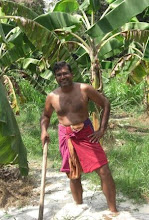
Four days after sowing a light green of the young shoots is visible
It is always an exciting event and a relief when one completes the sowing of the paddy fields, as there is an extraordinary amount of manual work that goes into this process. This is a luxury we can ill afford in the future, with the spiraling cost of labor in agriculture and so I believe it is something that will shortly disappear to be replaced by more mechanical and automated equipment. I am relived at finishing my planting today, but I am most displeased with the interference from the busybodies of our agricultural society who have restricted me to plant sixty five percent of my fields, as the water allocation has been reduced accordingly due to the lower rainfall, and the less water available this year. It does not matter to them that I had already decided to pump the water at my expense, accepting that I may not receive a drop of water.
This is yet another example and I have quoted many in the various writings in my blog, where it seems to be the order of the day to keep farmers impoverished. It is the farmers themselves to blame for it as they do not appear to like any other farmer using different means to improve his productivity. People are free to do what they like in other careers but farmers are tied by a set of nonsensical rules to impose equality. No wonder farming at the basic level is an utter failure, as none of the really productive farmers in the island are helped along to maximize their potential, as jealousy and envy reign.
I will leave the philosophical discussion on the rights and wrongs of the methodology of agriculture to my farming related blog, www.villagerinsrilanka.blogspot.com
The end of the war led to the rejoicing, a level not seen in these parts ever, with more crackers being lit than anyone old can even recall and every home preparing kiri bath as an act of thanksgiving. We now come to the reality of what it has meant and the real sacrifices, as the boys are now coming home from the battle-field with the tales, and heroics.
One of my neighbors Kumara, came home from the thick of the battle unscathed, he had rejoined his unit, after recovering from wounds from a previous battle on the Muhamalai front, but this time he had to carry one of his mates in the village in a different unit, who had been hit, where the shrapnel is still lodged in the stomach, and he is undergoing a series of operations in Colombo. This boy’s father borrowed some money from me, and is late in repaying, but under these conditions where his son is fighting for his life in hospital, I have to defer any thought of recovery.
This is the reality in the village, something no one writes about. I have mentioned a few times already on the blogs about deaths and wounded here in Raja Ela, Hingurakgoda, and Ratmale, so multiplying that into the number of villages extrapolates into a staggering cost of lives lost and permanent disability. When we are only reading about the IDP camps, and the HR violations, spare a thought for the real people on both sides who are affected. War is bad, which ever way one looks at it, and all our efforts should be to prevent another violent uprising even if we are confident of crushing it.

Just after sowing watering to wet the surface from excessive burn
















